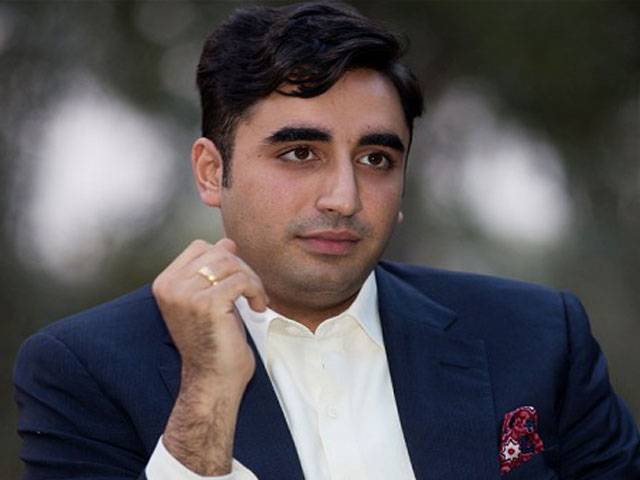LAHORE - Of late, much hue and cry was heard in the neighboring India over Bilawal’s statements on Kashmir and Indian Prime Minister Narendra Modi who took a hard line regarding the issue in the UN General Assembly meeting last month.
The PPP patron-in chief suddenly became the most unpopular Pakistani politician in India as he talked of getting the entire Kashmir at any cost. His slogan: “Marsoon Marsoon Kashmir na Daisoon” (We would die, but won’t give in over Kashmir) made headlines in the media both at home and in the neighborhood.
His sudden appearance at London’s Million March last week to express solidarity with Kashmiris was the latest manifestation of his anti-India posture while he is being seen as a hardliner with much criticism coming from the Indian media.
With the tension rising between the two neighbours over violations at the LoC, many ask what politics is behind Bilawal’s anti-India stance and why he has crossed all limits of diplomacy in his criticism of that country.
One can find the answer in the context of our domestic politics. It is a fact that a leader unpopular in India is popular in Pakistan. Many see it an attempt to capture the right-wing vote in Punjab where anti-India feelings are strong compared to other provinces. It is also here that PPP desperately needs political support to regain its lost turf. Besides the PML-N, Bilawal’s party is now facing a tough challenge from another emerging political force in the form of PTI. Now the PPP would have to fight on two fronts in the coming electoral battles.
Bilawal’s harsh statements against India are also being interpreted as a bid to gain international recognition as a leader. Since he is eying the top most position in Pakistan, he has to establish his credentials as such, analysts say. Some also believe that by his opposition to India, Bilawal is trying to project him as a great patriot to make him acceptable to the military establishment.
It may be recalled here that Bilawal’s grandfather and PPP founder, ZA Bhutto, also created a feeling of nationalism in Pakistan by taking a tough stance against India. He touched the peak of his popularity at home when he opposed the Tashkent Agreement after the 1965 war with India. He also quit Ayub Khan’s cabinet as the country’s foreign minister to found his own party. The PPP emerged as the majority party in West Pakistan as a result of 1970 elections. In the initial few years, Kashmir remained the corner stone of PPP’s foreign policy. But things changed altogether when Bhutto, as the country’ prime minister, signed the controversial Shimla Accord with India in 1972. According to one of its provisions, the two countries agreed to resolve all mutual disputes through mutual dialogue.
Bhutto was criticised at home for its connotation as India later took the stance that this agreement had virtually rendered the UN resolutions on Kashmir ineffective. As per India’s interpretation of Shimla Accord, the two countries are now bound to settle their disputes only through mutual talks.
The only significant outcome of the accord was that Pakistan was able to get back its 90,000 prisoners of war who, some say, had become a burden on India’s exchequer and it wanted to get rid of them.
Pakistan and India enjoyed cordial relations when Bhutto was in power. They remained cordial even during the tenure of Ziaul Haq who overthrew the government of Bhutto in 1977.
It has yet to be seen if Bilawal would be able to exploit the anti-India sentiments to muster support in Punjab, a province that decides which party should rule at the Centre. And it is here that PPP is fast losing ground vis-à-vis other parties.
Bilawal’s critics, however, think that he would not be able to muster the support of Punjabi voters through such political gimmicks. He is living in a different Pakistan where things have changed a lot over the time, they say.
Friday, April 19, 2024
Why is Bilawal taking anti-India stance?

President Zardari confers Nishan-i-Imtiaz (M) award on Turkish CGS
8:23 PM | April 19, 2024
NA speaker suspends two MNAs for disruptive behavior during presidential address
8:20 PM | April 19, 2024
PM Shehbaz orders accelerating countrywide drive against smuggling
8:19 PM | April 19, 2024
LHC allows PTI to hold rally in NA-119
8:18 PM | April 19, 2024
Balochistan cabinet members to be assigned portfolios shortly, says CM Bugti
8:17 PM | April 19, 2024
A Tense Neighbourhood
April 19, 2024
Dubai Underwater
April 19, 2024
X Debate Continues
April 19, 2024
Hepatitis Challenge
April 18, 2024
IMF Predictions
April 18, 2024
Kite tragedy
April 19, 2024
Discipline dilemma
April 19, 2024
Urgent plea
April 19, 2024
Justice denied
April 18, 2024
AI dilemmas unveiled
April 18, 2024
ePaper - Nawaiwaqt
Advertisement
Nawaiwaqt Group | Copyright © 2024





